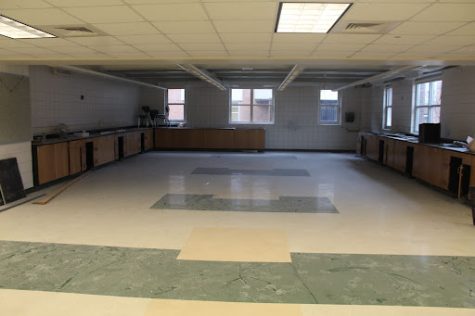Community health check-up: Adolescent health clinic to open in science building
January 6, 2023

(Photo credit: Annabelle Julien)
On May 18, GPPSS was awarded a grant from the Michigan Department of Health and Human Services to open an Adolescent Health Clinic which will be operated by Beaumont Health. On Nov. 28, the board approved the location of Grosse Pointe North High School for the clinic. Services will be available to anyone ages 5-21 within the Grosse Pointes and Harper Woods. Additionally, the clinic will be non-profit and patients will not need insurance to receive treatment. The grant given to GPPSS will be used to cover medical expenses relating to the clinic, whereas additional money will be taken from the Sinking Fund, a fund that goes towards repairs, in order to cover construction costs.
Controversy has arisen regarding the use of the Sinking Fund. Board member Ahmed Ismail, who voted in opposition of the clinic, has multiple concerns about the integrity of the board due to its usage of the tax-payers’ money. What was originally supposed to cost $700,000 has increased to $989,000. The importance of being honest with taxpayers is something Ismail stresses, which was his main reason for voting against the clinic.
“I believe we have an ethical responsibility to our taxpayers to spend the money on the infrastructure repairs on which we told them during countless public meetings it would be spent,” Ismail said. “After all, if we don’t spend it on the repairs we promised, why should they trust the school system the next time they are asked for a millage or bond?”
While the integrity of the board may be a factor to consider, there are additional reasons for people to be skeptical. Safety and overall usefulness of the clinic are two main concerns for senior Grace Korkmaz. Korkmaz believes the clinic will be a mostly unused space and is distressed about its accessibility to the public.
“This clinic is proposing that we let random strangers into the building simply on account of them needing non-emergency medical attention that [can] be found somewhere outside of the school,” Korkmaz said. “And by dedicating resources and funding to this health clinic you’re inadvertently taking it away from something else, and it’s a concern to me what we would be taking that funding away from.”
However, some people believe that the new health clinic could be valuable and become something beneficial for the community. North parent Pellayia Roustemis is supportive of the health clinic and believes that it could be helpful from a financial standpoint.
“An on-site clinic eliminates the need for students having to leave premises and going to the doctor if it’s for something minor,” Roustemis said. “It’ll be beneficial for the students from a financial aspect, and ultimately, it would be nice to have if someone wasn’t feeling well. It would eliminate making an appointment, having the copay and the time factor that it takes to do that.”
With the implementation of the clinic, RN, BSN and North parent Melissa Sexton believes that the clinic has the potential to prevent students from getting sick and therefore could improve school attendance.
“With staffing shortages throughout most of health care right now, it is getting increasingly difficult to get appointments quickly at doctor’s offices,” Sexton said. “If having a health clinic at the high school allows children to be seen quickly and efficiently, it will keep more kids in the classroom and possibly cut down on the spreading of infections.”
Currently, the cost of health care makes it inaccessible to a number of people, according to Sexton. However, Sexton is optimistic about the changes and improvements the clinic will make to the lives of people who struggle to access health care.
“I hope this clinic will provide much needed access to health care for all GP kids, but especially for the children who do not have health coverage,” Sexton said. “Quality access to health care should be a right, not a privilege, and I appreciate that GP schools are looking to protect all of its students.”











